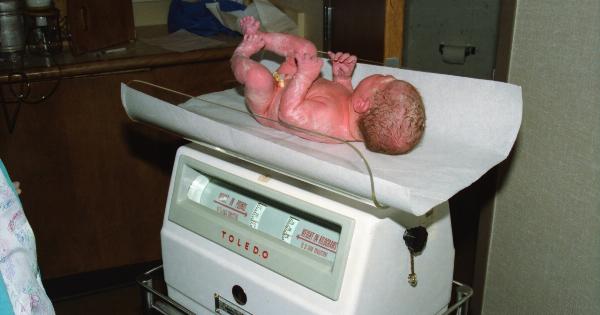One of the major concerns for parents is ensuring that their baby’s weight is within a healthy range. As babies grow and develop, their weight can vary, and it may be difficult to determine whether their weight is normal or not.
In this article, we will discuss various factors that can influence a baby’s weight and provide guidance on what is considered normal.
Factors Affecting Baby’s Weight
Several factors can influence a baby’s weight, including:.
1. Genetics
Genetics play a significant role in determining a baby’s weight. If both parents have a larger build, it is likely that their baby will also have a higher birth weight and potentially continue to be on the heavier side throughout infancy.
2. Feeding Habits
The feeding habits of a baby can directly impact their weight. Breastfed babies tend to have a slower weight gain compared to formula-fed babies, as breast milk is designed to meet the specific nutritional needs of the baby.
On the other hand, formula-fed babies may have a more rapid weight gain due to the higher calorie content of formula milk.
3. Activity Level
A baby’s activity level can influence their weight. Babies who are more active tend to burn more calories, which can affect their overall weight.
However, it is essential to note that babies’ activity levels vary greatly, especially during the first few months when they spend most of their time sleeping.
4. Developmental Stage
The developmental stage of a baby can also affect their weight. For example, during growth spurts, babies tend to gain more weight and appear chubbier.
Similarly, during teething or illness, babies may lose their appetite, resulting in a temporary decrease in their weight.
What is Considered Normal?
It is important to remember that weight alone does not determine a baby’s overall health. Instead, it should be considered alongside other factors such as height, head circumference, and overall development.
The World Health Organization (WHO) provides growth charts that reflect the average weight and growth patterns of infants.
Newborn to Three Months
During the first three months, it is normal for babies to lose weight initially and then regain it by the end of the first week. On average, newborns gain around 5-7 ounces per week. By the third month, most babies have doubled their birth weight.
Three Months to Six Months
From three to six months, babies continue to gain weight at a steady pace. On average, babies in this age range gain around 1-2 pounds per month.
Six Months to One Year
As babies start to transition to solid foods, their weight gain may vary. On average, babies in this age range gain around 1/2 to 1 pound per month.
Monitoring Your Baby’s Weight
Regularly monitoring your baby’s weight can help ensure that their growth is on track. Here are some tips for monitoring your baby’s weight:.
1. Pediatrician Check-ups
Schedule regular check-ups with your pediatrician, who can assess your baby’s growth and development.
At these appointments, the doctor will measure your baby’s weight, length, and head circumference and compare them to the standard growth charts.
2. Regular Weighing
Weigh your baby regularly at home. Use a reliable baby scale and weigh your baby once a week at the same time of day to ensure accuracy. This can help you keep track of your baby’s weight gain trend.
3. Balanced Diet
If your baby has started solid foods, provide a balanced diet with a variety of fruits, vegetables, grains, and proteins to support their growth and development.
4. Seek Professional Advice
If you notice any significant changes in your baby’s weight or if you have any concerns, consult with your pediatrician.
They can provide appropriate guidance and ensure that there are no underlying health issues contributing to your baby’s weight.
Conclusion
Understanding whether your baby’s weight is normal can be a source of worry for parents. However, it is important to remember that weight alone is not the sole indicator of a baby’s overall health.
By considering factors such as genetics, feeding habits, activity level, and developmental stage, you can gain a better understanding of your baby’s weight. Regular check-ups with the pediatrician, monitoring weight at home, providing a balanced diet, and seeking professional advice when needed, can all contribute to ensuring your baby’s weight is within a healthy range.




























